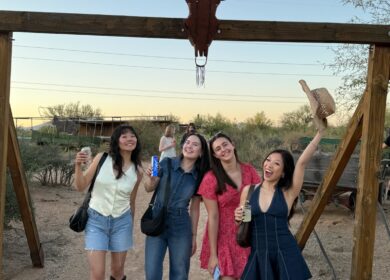
By Hibo Abtidon, Account Coordinator
We touched on how our values go beyond the average company blurb seen on websites or within a boilerplate; how they guide us in our everyday interactions with others and serve as the cornerstone of our operations from the top-down.
Our No. 1 value, Everyone is Valuable, emphasizes the need to invest time in relationships with our colleagues. Our next value, Trust, takes it a step further. Once that relationship is established, trust becomes a quintessential component of its longevity and success.
Let’s look into what Trust means to us at Hoffman and how it impacts our everyday work.
Vanessa See, Account Executive (APAC)
I view trust as the ability to be vulnerable, while feeling safe. I apply our value of trust by maintaining open channels of communications with my team and ensuring that they feel safe coming to me for help. Similarly, I can see the effort of my team leads in creating safe spaces for junior team members to feel heard. Trust is critical in any relationship — working or personal — and without it, the relationship cannot grow, let alone survive. It enables our success and allows us to lean on our colleagues and go above and beyond — delivering even greater results for Hoffman and our clients.
Andree Latibeaudiere, Account Director (EU)
Trust forms the foundation of every relationship we have — be it personal, familial or professional. Without trust, there is no safety to express our ideas and be our authentic selves. So much of PR is based on having great relationships, and trust is a fundamental component. I try to build trust into everything that I do. It can be something as simple as meeting a deadline, but if I break my colleague’s trust by failing to fulfil a task, that affects their confidence in me. And that can be difficult to rebuild if it’s lost or damaged.
Having strong trust between colleagues and within teams creates a sense of belonging and safety. Against this backdrop, good ideas and great work can be shared as everyone is sure that their colleagues have the best intentions. It’s something that my team really values and tries to maintain, as it’s critical to the quality of the work produced. We need to trust each other to ensure that we’re giving our best to each task and we’ll work hard to ensure that we’re hitting that goal.
Kelly Stone, Vice President (U.S.)
Trust as a value means that we can rely on one another for open conversations, collaborative processes, and a sense of integrity in our commitments to our teams and clients. This is critical because if we don’t have trust, we will struggle to feel safe, and people do not work well when they feel insecure. In my teams, trust is applied through the form of our open and honest conversations. I aim to truly do what’s best for the clients and teams I work with; when those efforts are reflected in outcomes that help people, I believe trust is increased between both of us.
Melissa Lewelling, Account Manager (U.S.)
Trust is vital and fundamental to Hoffman’s success. It is earned and built over time, but once it’s acquired — both from peers, managers and clients — then it gives individuals (and even full teams) the freedom to soar and experiment like never before. Not only that, but it also means having the freedom to make mistakes and learn and grow, while simultaneously being supported and set up for success. Trust means that even if an idea feels like a long shot, I’m given the runway to try because there’s trust that I’ve thought through the recommendation and it’s based on something solid.
With clients, trust is rooted in a track-record of high-quality work and sound strategic counsel. With teams, trust is built through accountability and consistently delivering well on items in your care. With the people I manage, trust is exercised by providing the necessary guidance and support on the front end of a task and then letting them run with it — making it their own and bringing a new perspective. We’re all human so no one hits this perfectly every day, but Hoffman is exceptional about striving to make trust an everyday reality across work streams.
Nate Tolley, Account Manager (U.S.)
Trust means to be reliable and dependable, but I also think being responsible is a big part of it. Accountability for one’s work and actions and the willingness to acknowledge mistakes made and needs to self-improve make up an incredibly vital aspect of being trustworthy. PR can be hectic with fire drills and urgent projects popping up every week. It’s the trust, in ourselves, our colleagues, and even our clients, that allows us to work together smoothly and efficiently to get things done every day. I try to be an honest and reliable lead on my teams. That means owning up to my own mistakes, recognizing when my coworkers are doing great work, helping them overcome problems they’re encountering, and more. Moreover, everyone on my teams has more than earned my trust with their quality work ethic and amazing personalities.
Rita Yang, Senior Account Executive (APAC)
You can’t do anything without trust. At Hoffman, employees are trusted, making them feel safe and confident — all of which enable a strong sense of ownership. For example, there is no clocking system at Hoffman China, because Hoffman trusts us. Trust is everywhere — it’s a foundation of human interaction. At Hoffman, I trust my team leads and my partners, and as a result, we can move forward together to achieve shared goals. There’s also a big sense of reliability that comes along with trusting the people you often collaborate with. Team leads trust their junior staff to create quality work in an efficient and timely manner, which in turn empowers the junior-level employees.

